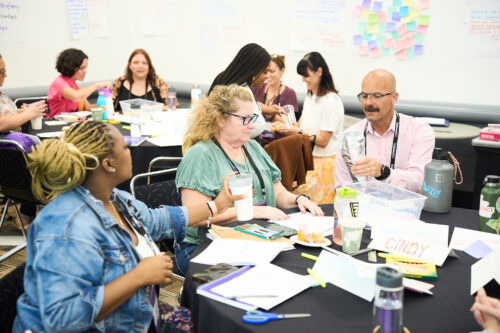
By Valery Dragon, Vice President, Leadership Programs
This is the first blog in a three-part series in which we consider how actions, beliefs, and knowledge impact leadership and identity.
Upon joining UnboundEd, the first task my manager asked me to do was to name my leadership legacy, which left me stumped. At our next meeting, she checked my progress with this task. I started to explain that my legacy was rooted in meeting the mission and listed all of the priority deliverables and processes I felt were implied in the job description that would have a long-term impact on our team. “On our team’s what?” she asked. This was the first time that I was pushed to think about my job description as a legacy. I think my manager enjoyed this push so much that we created a guiding question to start our weekly one-on-ones: how did you build on your legacy this week?
Two years into joining the team, we revisit this “task”— a reflection on the legacy we build each day through our beliefs, the knowledge those beliefs compel us to pursue, and the opportunities we get as leaders to put our knowledge and beliefs into action—every quarter. The thread between beliefs, knowledge, and actions often gets packed into the broad label of “approach.” Leadership is more than just how people experience you; it’s about knowing what makes you a leader others want to follow – the details of who you are.
In Justice Seekers, author Lacey Robinson pushes educators to consider how they carry the legacy of America’s educational history in our ideologies and warns that if this consideration is “left unchecked, one’s lexicon of prejudgments will continue to deepen and drive harmful behavior.” When working with school leaders, we spend time reflecting on who we are to deepen our understanding of our actions with one driving question: what drives your leadership? Through that reflection, we can name the actions that best align with rooting GLEAM™ — grade-level, engaging, affirming, and meaningful — instruction in our school systems.
We encourage you to consider the following actions and questions to assess yourself as a leader.
- Instructional actions: How do you ensure an equitable instructional teaching and learning experience?
- Cultural actions: How do you encourage both the agency and responsibility of your community to ensure an affirming and meaningful educational experience?
- Operational actions: How do you apply an equity lens to your policies, programs, and accepted processes?
With these considerations, take the following assessment to help facilitate an authentic reflection of your instructional, cultural, and operational actions.
Read the Blog Series


Leadership & Identity: Beliefs

